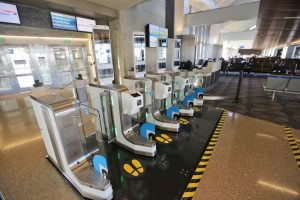Insights, News • November 8, 2018
Biometric Security is Here – But Not Without Concerns
Orlando International Airport is the first in the nation to expand automated facial recognition technology to all international travelers. The move represents an expansion of a U.S. Customs and Border Protection (CBP) experimental program that has already placed cameras at thirteen airports to screen passengers leaving the country or returning from overseas.
As a result, the facial data of approximately 5.9 million individuals per year will now be on file with the U.S. government. Besides Orlando, CBP has deployed facial recognition systems at airports in Miami, Atlanta, New York, San Diego, Houston, Washington DC, Las Vegas, Chicago, and multiple locations overseas.
According to a recent statement issued by CBP, passengers traveling to and from Orlando are promised a more efficient screening process and shorter wait times as a result of this new technology.

System designers claim this is a win for national security by providing a quick and accurate way to identify individuals while combating fraud.
“Airports are expanding use of facial biometric technology because it seamlessly integrates into the airport boarding process without a need for significant changes to existing physical infrastructure. The verification process takes less than 2 seconds and claims a 99 percent matching rate. Although the technology has been around for a while, its use in airports is relatively new. I believe within the next few years, you’re going to see most major airports starting large-scale rollouts of facial recognition systems,” notes John Plezbert, VP Milhouse Engineering & Construction.
As this use of biometrics expands, one of the greatest concerns is how the data will be protected. While the existing Illinois Biometric Information Privacy Act (BIPA) is the strongest law of its kind in the country, it continues to be challenged in the Supreme Court. An example is Illinois bill (S.B. 3053) which would create broad new exemptions from BIPA, greatly reducing the biometric privacy of individuals in Illinois and throughout the nation.
A recent uptick in biometric litigation highlights the vulnerability of companies using this technology, with eight lawsuits filed in just the first week of June 2018.
